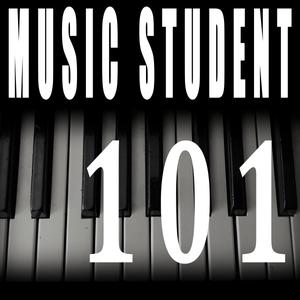
Music Student 101
Jeremy Burns, Matthew Scott Phillips
- 1 hour 1 minute139-Harmonic Sequences Pt.1
Melodic sequences occur frequently in music. They are often accompanied by harmonic sequences. Certain harmonic sequence patterns are constructed to preserve good voice leading without breaking the pattern. In this episode, we will focus on the descending circle of fifths sequence.
29 December 2024, 2:47 am - 1 hour 14 minutes138-Music and Grief
Grief, and the emotions that come with it, can often effect how we listen to music and how we write music. However, music can be a good companion during the healing process. In this episode we will share our experiences and those of some fellow musicians. We will discuss composers that have been stricken with grief and we will look at ways to use music to help with the healing process.
28 November 2024, 2:34 am - 1 hour 31 minutes137-Schenkerian Analysis Pt.2
In episode 132, we merely scratched the surface of Schenkerian analysis. We will now continue our discussion of prolongation and listen to a few more examples of horizontalization. We will then discuss how Schenker looks at dominant and predominant functions. Ready your theory brains!
28 October 2024, 11:47 pm - 1 hour 18 seconds136-Instrument Care Pt.5-Percussion
Percussion instruments are known to take a beating. Still, it's important to keep them safe, clean and properly maintained. In this episode, we will review the instruments of the percussion family and share some tips we found to keep them sounding and looking their best!
30 September 2024, 1:41 am - 1 hour 19 minutes135-Harmonic Progression Pt.12-Non Chord Tones
Passing tones, appoggiaturas, pedal tones and suspensions are just a few of the non chord tones we discussed in Ep. 28. Now we will take a little more time training our ears to recognize them. After all that, we will play examples and test our ability to identify them in a chord progression. Let's listen!
28 August 2024, 8:47 pm - 1 hour 10 minutes134-Middle Ages Music Pt.2
Continuing from episode 75, Middle Ages Music Pt.1, we will now get in the later part of this era. Polyphony is now becoming commonplace. We will discuss composition tools such as oraganum, chant, the motet and the hocket. We will also discuss how other cultures beyond the world of Western music use chant in their own music. Let's go back a bit, shall we?
29 July 2024, 12:00 am - 57 minutes 38 seconds133-Animals and Music Pt.2
We, at Music Student 101, believe that music is truly a common language! We wonder how it effects our animal friends. We wonder if some form of music exists among our animal friends. Join us as we discuss elephants, rodents, bats, crocodiles and mosquitoes!
28 June 2024, 8:10 pm - 1 hour 20 minutes132-Schenkerian Analysis Pt.1
Schenkerian analysis is a deeper dive into the sea of theory discussions we've had so far. In this episode, we will merely dip our toes into this counterpoint based system. Get ready for another perspective of how classical music works!
28 May 2024, 8:45 pm - 1 hour 42 minutes131-Melodic Dictation Pt.7-Phrygian Mode
Melodic dictation, the act of transcribing and notating a melody by ear, is a crucial skill for a musician to cultivate. In this episode, we will focus on the ever exotic Phrygian mode. Let's listen!
29 April 2024, 8:47 pm - 1 hour 47 minutes130-Listener Compositions Pt.7It is time for our 7th Listener Compositions episode. So let's enjoy the talents of our listeners! This episode will feature the original music of Fred Lancia, Mark Christie, Evan Bjork, Tom Richardson, Nikita Menkov and Devin Montes.28 March 2024, 9:47 pm
- 1 hour 4 minutes129-Perfect PitchOne out of every 10,000 people have absolute pitch (a.k.a perfect pitch). Many more, epecially musicians, wish they could have it. It's time to discuss this phenomenon and how it differs from relative pitch!27 February 2024, 10:40 pm
- More Episodes? Get the App
Your feedback is valuable to us. Should you encounter any bugs, glitches, lack of functionality or other problems, please email us on [email protected] or join Moon.FM Telegram Group where you can talk directly to the dev team who are happy to answer any queries.